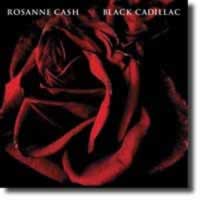|
 Rosanne Cash confronts the loss and legacy of her iconic father, Rosanne Cash confronts the loss and legacy of her iconic father,
stepmother and mother in her breakthrough album, Black Cadillac
Rosanne Cash’s Black Cadillac, released on January 24, 2008 by Capitol Records, is perhaps the most compelling release of her distinguished career. She wrote the twelve-song musical memoir over roughly two years in which she lost her father Johnny Cash, her stepmother June Carter Cash, and her mother Vivian Liberto Cash Distin. Yet Black Cadillac is remarkable not just for the context in which it was created, but for the defining achievement it represents in the scope of Rosanne’s own artistry and life. She describes the album as “a personal history and an overview of my ancestry,” and also as “a fusion of songs, musicians, and producers that was a dream and a dream fulfilled at the same time.” With Black Cadillac, Rosanne confronts her family legacy as never before while simultaneously pursuing her own bold creative path with renewed commitment.
Though she is heir to such a rich lineage, Rosanne has always been an artist of her own time, following a thoroughly independent vision from the outset of her career. She has earned continued critical praise, GRAMMY Awards and nominations, and eleven #1 singles relying on her own singular voice and sound, songwriting style and life experience. On the new album, Rosanne presents herself in her totality, seamlessly integrating all of this with echoes of her forebears’ music and an explicit acknowledgment of her place in the family line.
 This balance extends to the recording and innovative production of the album, which incorporates her signature approach to folk-rock and homegrown harmonies that recall her more distant family heritage. For half of the album’s tracks, Rosanne traveled to her childhood hometown of Los Angeles and worked with a new producer, Bill Bottrell (Sheryl Crow, Shelby Lynne). She recorded the other half with her husband and longtime producer, John Leventhal (Shawn Colvin, Joan Osborne) in New York City, where they live. Keyboardist Benmont Tench (Tom Petty and the Heartbreakers), a longtime Cash collaborator, contributes throughout. This balance extends to the recording and innovative production of the album, which incorporates her signature approach to folk-rock and homegrown harmonies that recall her more distant family heritage. For half of the album’s tracks, Rosanne traveled to her childhood hometown of Los Angeles and worked with a new producer, Bill Bottrell (Sheryl Crow, Shelby Lynne). She recorded the other half with her husband and longtime producer, John Leventhal (Shawn Colvin, Joan Osborne) in New York City, where they live. Keyboardist Benmont Tench (Tom Petty and the Heartbreakers), a longtime Cash collaborator, contributes throughout.
Arguably, the strongest resemblance Rosanne bears to her father lies in her willingness to face complex emotional challenges head-on and her ability to translate them into universally accessible art—a talent tested in the extreme by the circumstances underpinning Black Cadillac. Over the course of the album, Rosanne wrestles with the complexities of mortality, loss, reminiscence and redemption. The overall result is a well-rounded, life-affirming, and hopeful set of songs full of concrete narrative details and Rosanne’s emotionally charged meditations on these topics. “I’ve always found that songs can be postcards from your future,” says Rosanne of the album’s opening and title track, which was written six weeks before her stepmother, June Carter Cash, fell ill. “The Good Intent” takes its name from the ship that carried the first American Cash from Scotland to New England in 1653. “House on the Lake” is set in Johnny and June’s Nashville home.
Prior to Capitol’s January 24 release of Black Cadillac, Sony Legacy is issuing expanded editions of Rosanne’s landmarks Seven Year Ache (1981), King’s Record Shop (1987) and Interiors (1990). These reissues include a new collection, The Very Best of Rosanne Cash. Black Cadillac follows the GRAMMY-nominated Rules of Travel (Capitol, 2003), which features Johnny Cash’s final duet with her, “September When It Comes.” |
![]()
![]()